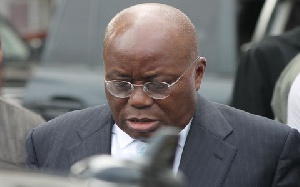The 2016 Flagbearer of the main opposition New Patriotic Party (NPP), Nana Addo Dankwa Akufo-Addo has parried perceptions that the party’s ‘property-owning democracy’ philosophy is driven by the love of luxury.
Speaking on Wednesday, on the topic: “Danquah – the unfinished agenda”, to mark the 50th anniversary of the death of the founder-member of the NPP's forebear political tradition – Danquah-Busia-Dombo – the former Attorney General quoted Danquah in 1950 as saying: “Our duty is to liberate the energies of the people for the growth of a property-owning democracy in this land, with a right to life, and freedom and justice as the principles to which the government and laws of the land should be dedicated to in order specifically to enrich the lives, property and liberty of each and every citizen.”
“This became the policy of the United Party, and is today the policy of the New Patriotic Party,” he said.
The former foreign affairs Minister argued that: “In the eyes of this great man who founded our tradition, a property-owning democracy for a free, independent Ghana could never mean luxury for an elite at the expense of the poor.
“His vision was to establish a foundation of equal opportunities which will enable the broad spread of the benefits of private ownership to the greatest majority of citizens, not just a rich and privileged few,” he added.
In his view, “Danquah’s vision was to build in Ghana a society where every Ghanaian was empowered with access to education, skills and job opportunities to contribute fully to nation building and self-enhancement.”
“This was why the policy of the NPP government from 2001 to 2009 was to clear the ground for the purpose of inviting every Ghanaian to climb the ladder of competitive achievement. We know that, without many players, markets fail to deliver quality at the best price and without everybody on board, our democratic ship risks sinking under its own tilted weight.
“This thinking is very much against what is being exhibited currently in Ghana, which permits a small class to have a near monopoly of the wealth of the country. A similar state of affairs in his day made Danquah declare in 1950 in the Legislative Council about the colonial government: “What we want is a Government in touch with the very life of their people, the sorrows, their groans, their wants, their sufferings and their grievances and until we get that government this country will forever continue to agitate and demand for a better Government.””
General News of Thursday, 5 February 2015
Source: starrfmonline.com













